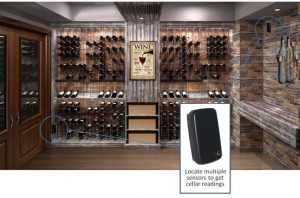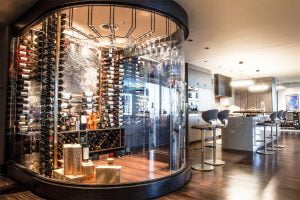For wine enthusiasts, there’s nothing more precious than their wine collection. If you also have a collection of wine at home or planning to set up a commercial wine cellar, make sure you invest in the right cooling system. When it comes to setting up a wine cellar, many people focus on buying expensive bottles, wine cabinets and racks, accessories, and attractive lights. However, they make the major mistake of avoiding the most crucial factor- temperature. Typically, it is recommended to maintain an average temperature of 55°F for wine storage with humidity between 60-70%. If the temperature goes below 50°F, your wine will fail to age while temperatures above 80°F will ruin the liquor.
Some people believe that with minimal light, no vibration, and temperature around 60 degrees, their basement is perfect for storing their precious bottles. However, no home can naturally have a consistent temperature around 55-57 degrees and 55-75% relative humidity. The temperature keeps fluctuating with seasonal changes which make it crucial to find the right wine cellar cooling unit. Without a proper cooling system, it’s impossible to keep your wine safe and allow it to age exactly how it was intended. Even if your home or restaurant has a central air conditioning system, a cooling unit is still required for your wine cellar. Are you still wondering what exactly the wine cellar cooling system is and why it is important? Let’s find out more about it!
What is Wine Cellar Cooling System?
A wine cellar cooling unit is an appliance used to maintain an optimal temperature inside the wine cellar. When it comes to wine aging, temperature helps in maturation while controlling the humidity keeps corks in good shape. A cooling unit helps in controlling both temperature and humidity to maintain the quality of the wine. A fluctuation in the temperature and humidity level will either cook the wine or hinder the maturation process. When the temperature goes above or falls below the optimal levels, the bottle corks can either get over soaked or dry out that could ruin your prized collection.
Types of Wine Cellar Cooling System
When it comes to choosing the right cooling system for your cellar, there’s no one-size-fits-all approach. You need to consider multiple factors such as climate, insulation, location of the cellar room, size of the cellar, and more. Whether you’re an amateur collector or an aficionado, you need to choose between different types of wine cellar cooling units available that suit your specific needs. Here are some types of wine cellar cooling units:
1. Self-Contained
The self-contained cooling units, also known as through-the-wall cooling systems are easy to install and can be used in wine cabinets and wine rooms. As a self-contained system, this type of unit doesn’t need ductwork or refrigeration lines. A self-contained cooling unit looks similar to a window air conditioner. It is typically mounted and vented via walls. It is a cost-effective option but makes sure to provide proper ventilation to this type of unit. Also, it works best for small wine cellars and may have noise issues.
2. Ducted System
If you want to keep the cooling unit out of sight, consider a ducted system. This type of cooling unit remains far away from your cellar but provides needed air conditioning. It utilizes a duct system that eliminates noise and vibration while maintaining the proper temperature. You should consider this type of unit if you want to maintain the aesthetics of a big wine cellar and prefer a quiet operation. However, it has costly installation.
3. Split System
Another popular type of cooling system is split units that work well for cellars that lack proper ventilation. This ductless split system is renowned for their efficiency and often last longer than self-contained units. It can be used for large wine cellars and provides noiseless operation.
Factors to Consider When Choosing a Cooling System
Now that you know the different types of cooling systems, you need to pick the right one based on some critical factors. Here are some factors to look for when choosing a cooling unit.
Power & Capacity
The cooling units with a higher power capacity are expensive and used for large or commercial cellars. Make sure to consider the cooling needs of your cellar to choose the right power capacity and voltage. The cooling systems with 110V power are available for affordable prices while higher power such as 220V power units is expensive.
Noise Level
Noise level is also an important consideration to ensure that the cooling unit doesn’t disturb the ambiance of your house. Split and ducted systems have a noiseless operation but their installation cost can be higher.
Digital Temperature Control
It is best to look for a cooling system with an electronic temperature control along. The best units have temperature control along with a digital display that makes it easier to control temperature and humidity levels. So, make sure to invest in a wine cellar cooling unit that meets your specific needs and budget.




